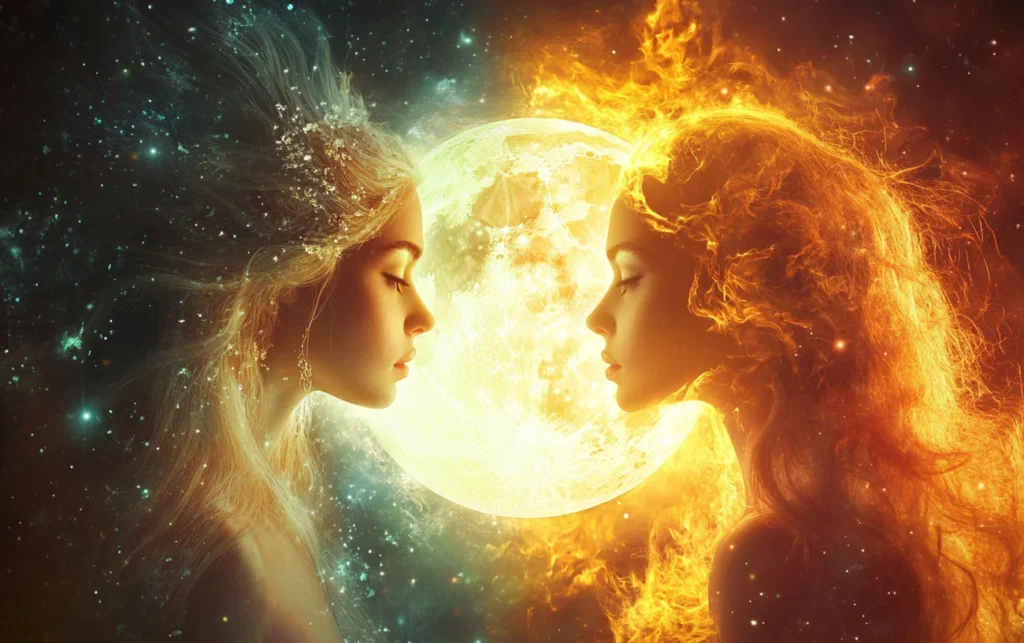Do you strive to reach new heights with a list of achievements, or do you rely on intuition and fate to guide your journey?
People display different facets of their character depending on their surroundings. A strict manager at work can be a gentle partner at home, while a mediocre employee might excel as a caregiver in their personal life.
Astrologically, these differences are linked to the activation of various elements in the natal chart, particularly the Sun and the Moon. These celestial bodies represent two essential aspects of personality: the external and internal worlds, the conscious and subconscious, the energy of Yang and Yin.
Understanding how your behavior shifts under the influence of these luminaries can help you manage your reactions and roles with greater self-awareness. So, what is a Sun Personality and a Moon Personality? Which type resonates more with you, and how can you balance these traits?
Sun Personality: Characteristics
The Sun: Leadership and Manifestation
The Sun is the central element of a natal chart and the most well-known aspect of astrology. When someone asks for your zodiac sign, they refer to your Sun sign.
The Sun symbolizes the conscious part of your personality and governs how you present yourself to the outside world. It represents your character, actions, ambitions, and charisma. This is the active side of you—the part that takes charge, makes decisions, and pursues goals.
The Sun embodies your inner adult, taking responsibility, creating plans, and pushing forward even through adversity. It fuels the drive to assert yourself and achieve success.
The Sun becomes dominant when you:
- Work toward goals.
- Take on leadership roles in your life or among others.
- Express individuality and uniqueness.
- Make important decisions rationally.
This aligns with the Yang energy in Eastern philosophy—activity, initiative, charisma, leadership, and the pursuit of success.
Moon Personality: Characteristics
The Moon: Emotions and Comfort
In astrology, the Moon symbolizes your emotional and intuitive side. It governs your inner world, feelings, and subconscious mind. Unlike the Sun, the Moon is guided more by emotions than logic. It represents your ability to nurture, love, and care—for yourself and others.
The Moon is your inner child, a vulnerable yet essential part of your being. It reflects your capacity for joy, your sensitivity to life’s small pleasures, and your need to let go and simply be. The Moon rules emotions such as joy, sadness, fear, and hope, shaping how you perceive and express these feelings.
The Moon governs moments when you:
- Rest, allowing yourself to relax and disconnect from external pressures.
- Feel emotions deeply, regardless of external circumstances.
- Interact with loved ones, expressing affection or receiving care.
- Rely on intuition for decisions rather than logic.
This embodies Yin energy—acceptance, tenderness, and nurturing care.
Sun or Moon: Which Should Dominate?
Both luminaries are constantly active in your life. Ignoring either one can lead to imbalance—shutting down your conscious or subconscious selves can negatively impact all areas of your life.
The ideal scenario is a balanced interplay of these forces. For instance:
- At work, let the Sun guide you with ambition, leadership, and rationality.
- At home or during downtime, allow the Moon to take over, bringing relaxation, emotional openness, and a sense of care.
However, many people naturally lean toward one energy or the other.
When the Sun Dominates
People with strong Sun energy prioritize being visible, successful, and in control. They are achievers and often overloaded with responsibility. Rational decisions and logic guide their actions, often at the expense of their inner needs.
Downside: Over-dominance of the Sun can lead to burnout, loneliness, or personal dissatisfaction. Over time, such individuals may face emotional or mental health challenges like depression or apathy.
When the Moon Dominates
Moon-dominant individuals often avoid responsibility, preferring to be followers rather than leaders. They wait for others to make decisions or for circumstances to improve on their own, while they focus on personal comfort and emotional well-being.
Downside: Excessive reliance on the Moon can result in passivity and dependency—on parents, partners, or external situations. Over time, this can lead to stagnation and dissatisfaction.
Finding Balance Between the Sun and Moon
The key to a fulfilling life is harmonizing these energies. The Sun should drive ambition and action, while the Moon provides emotional depth and balance.
- At work or in goal-setting, let the Sun take charge with initiative, responsibility, and logical decision-making. Trusting your intuition occasionally can help, but don’t over-rely on it for critical matters.
- At home or in personal life, the Moon should lead, fostering relaxation, emotional connection, and nurturing care. Even then, maintaining a sense of responsibility (guided by the Sun) is essential.
How to Identify Your Sun and Moon Traits
Your natal chart reveals the zodiac signs of both your Sun and Moon, which shape these traits uniquely. Knowing their placements can help you understand where to assert leadership and where to nurture emotional well-being.
The Sun and Moon represent the dual nature of our personality. Together, they form a complete and harmonious whole. By embracing both roles—action-driven Sun and emotionally-attuned Moon—you can unlock your full potential.
Strive for balance, letting your Sun energize your ambitions while your Moon nurtures your soul. After all, life is richer when we honor both the light of day and the serenity of night.

